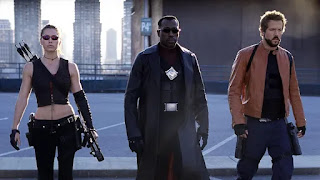(1998)
Dir - Stephen Norrington
Overall: GOOD
Notable as the first not terrible Marvel movie, Blade was an unlikely candidate for such an honor as it was based on the Marv Wolfman and Gene Colan creation from Tomb of Dracula and not one of the flagship characters co-authored by Stan Lee. Those movies would of course come shortly thereafter and kick the MCU into proper gear, but director Stephen Norrington and screenwriter David Goyer's reinterpretation of the character here is delivered with the right amount of B-movie gusto as to not be insulting. We do have embarrassing digital effects, a few quips that generate a "Huh?" instead of a chuckle, glossed-over plot maneuvers, and hackneyed conveniences that are in place to move things along, but all parties involved maintain the correct schlocky tone that remembers to include humor, style, and bad-assery in equal measures. The performances go a long way in selling such silliness, with Stephen Dorf making a charismatic smart-ass villain, N'Bushe Wright holding her own as a victim-turned-vampire-hunting-assistant, Kris Kristofferson as a cross between a Hell's Angel and Batman's Alfred, Donal Logue hamming it up as a surfer bro undead, and of course Wesley Snipes relishing in his most celebrated role as the brooding, leather-clad, silver-wielding, martial arts expert, "daywalker" title character.
(2002)
Dir - Guillermo del Toro
Overall: GOOD
For their second go-round with Blade II, screenwriter David Goyer, producer Peter Frankfurt, and star Wesley Snipes follow the standard sequel trajectory, maintaining the same R-rated popcorn-munching tone of the predecessor while simultaneously going bigger in its trajectory. The death of Kris Kristofferson's Abraham Whistler is lazily retconed, but this is forgivable since he and Snipes' chemistry together still provides a touching bedrock for otherwise schlocky undead fun. New bad guys emerge in the form of veiny, vagina-mouthed nosferatu types who are trickier to kill than the more conventionally vulnerable blood-suckers, and the plot unfolds with another secret society, an unlikely allegiance, some good ole foreseeable backstabbing, and plenty of smash-em up kung fu fights where Blade manages to keep his sunglasses on without breaking them. Joining the fun is another international cast, including a pre-The Walking Dead Norman Reedus and director Guillermo del Toro's favorite Caucasian collaborator Ron Perlman who gets to try and out-bad-ass Snipes, with futile results of course. The digital effects are as bad as any from the early 2000s, but the practical makeup ones are expertly realized, making the "reaper" mutants a memorable new edition.
(2004)
Dir - David S. Goyer
Overall: MEH
The initial Blade trilogy wrapped up with Blade: Trinity, the dopiest and weakest in the series. Production issues stemmed from Wesley Snipes being unhappy with everything from the script, to Ryan Reynolds being Ryan Reynolds, to the initial director choice, to the eventual director choice in continual screenwriter David S. Goyer. On set tensions were infamous, with Snipes failing to corporate and even resulting to fisticuffs with Goyer, yet all of the heavy drama oddly resulted in a goofier end result than either of the two movies before it. Snipes quips more and actually smiles, Reynolds could not take such material seriously if a loaded gun was to his head, Patton Oswalt can also not take such material seriously if a gun was to his head, and various scenes are played to tongue-in-cheek chuckles as the schlock is leaned into tenfold. Sadly, most of these moments are groan-worthy instead of wicked awesome. It is difficult to buy into Parker Posey of all people smirking like a bad ass while she sways in slow motion towards the camera, and the same can be said about a muscle-bound Dracula, (doubling as the lamest in cinema history), also strutting to hip hop music as he waltzes into a Goth boutique store to frown at boxes of Count Chocula. Then Snipes takes a backseat to his own starring vehicle from the second act on, leaving plenty of room for hackneyed exposition and cartoonish digital action sequences that bombard the screen with no sense of compelling agency.



No comments:
Post a Comment